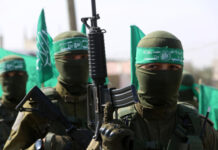
In the aftermath of the recent Israel-Hamas conflict, the Taliban issued a statement, causing ripples across the international community. The Ministry of Foreign Affairs of the Islamic Emirate of Afghanistan, as the Taliban is officially known, urged Islamic nations and the global community to take action against Israel.
The Taliban’s statement comes at a time when tensions are high in the Middle East. The group has been closely monitoring the events in the Gaza Strip and attributes the conflict to what it perceives as violations of Palestinian rights by Israeli Zionists.
The Taliban also expressed its concern over repeated insults and disrespect towards Muslim holy places.
Trump RE: Equipment left to Taliban
“Milley said it’d be cheaper to leave all of our equipment behind in Afghanistan, instead of flying it back. That’s when I knew he was a fucking idiot!” pic.twitter.com/gZUPQ3lbhv
— 🇺🇸ProudArmyBrat (@leslibless) October 8, 2023
The statement further emphasizes the Taliban’s belief in the legitimacy of any form of defense and resistance by the Palestinian people for the freedom of their land and sanctuaries. This perspective aligns with the group’s long-standing stance on the Israel-Palestine issue.
Interestingly, the Taliban’s call to action extends beyond the Islamic world.
The group appealed to the Organization of Islamic Cooperation (OIC), the second-largest intergovernmental organization after the United Nations and other influential countries in the region to intervene in the conflict.
The Taliban’s plea for these entities to prevent violence from Israeli forces against innocent Palestinians underscores the group’s desire for a resolution based on granting Palestinians their legitimate rights.
This development comes amid reports that US weapons left behind in Afghanistan have found their way into the hands of Palestinian factions in the Gaza Strip. These weapons were reportedly smuggled out of Afghanistan following the US Army’s hasty withdrawal in 2021.
Influential Taliban leaders explain that female infidels can be taken as sex slaves. He says they are equal to animals and that a Mujahid can have hundreds as sex slaves at once.
These are the people Biden left 83 Billion in US Military hardware to. pic.twitter.com/NFbJI2huAO
— Epstein's Sheet. 🧻 (@meantweeting1) October 9, 2023
The Taliban’s resurgence in the country has led to an increase in the availability of American-made arms, which are now being sold by Afghans in the south of the country.
Furthermore, there are claims that US weapons surfaced in Indian-controlled Kashmir earlier this year after they were reportedly purchased from the Taliban by Pakistani groups. This information adds another layer of complexity to the already intricate geopolitical landscape in the region.
The Taliban’s statement following the Israel-Hamas war is a clear indication of the group’s stance on the issue. The call for Islamic nations and the international community to act against Israel is a significant development that could potentially influence the dynamics of the Middle East conflict.
As the situation continues to evolve, it remains to be seen how the global community will respond to the Taliban’s call to action.











